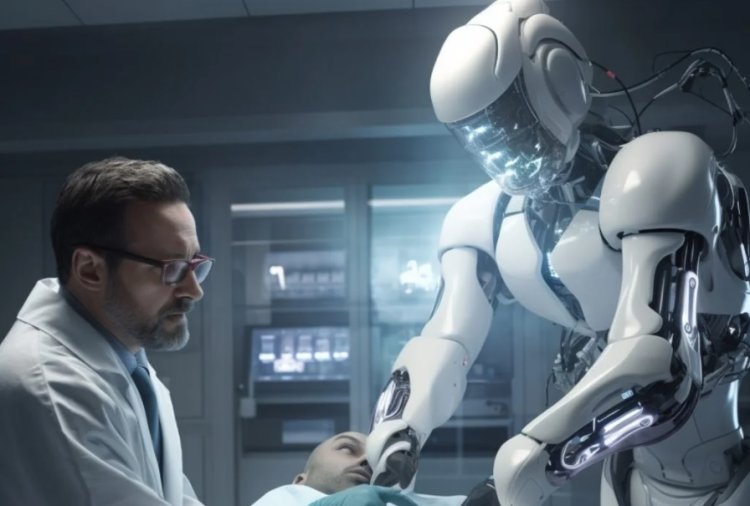What Innovations Can We Expect in Cosmetic Surgery?
What Are the Advantages?

What Innovations Can We Expect in Cosmetic Surgery?
MEDİCENTERTV.COM / İZMİR / TÜRKİYE
Cosmetic surgery is constantly evolving with rapidly advancing technology and scientific progress over time. Anticipated innovations in the field of cosmetic surgery aim to make procedures safer and more effective while better meeting patient expectations.
Robot-Assisted Surgical Applications
One of the anticipated innovations in cosmetic surgery in the future is the wider adoption of robot-assisted surgical applications. Robotic surgery involves advanced robot systems that allow surgeons to work with smaller incisions and more precise movements. These technological advancements aim to enable cosmetic surgeons to work with higher precision, causing less tissue damage, and facilitating faster recovery processes.
Robotic surgery involves a system where the surgeon sits at a console and controls robotic arms. These robotic arms mimic the surgeon's movements with high precision and direct surgical instruments. Precise sensors and camera systems provide the surgeon with a detailed view of the surgical area, allowing for better decision-making and more effective procedure execution.
What Are the Advantages?
Precision and Control:
Robotic surgery allows surgeons to focus on finer details, enabling cosmetic surgeons to perform more delicate procedures and achieve natural results.
Less Tissue Damage:
Compared to traditional surgical techniques, robotic surgery is often performed with smaller incisions. This means less tissue damage and may accelerate patients' recovery process.
Three-Dimensional Imaging:
Robotic surgical systems provide surgeons with a detailed three-dimensional view of the surgical area through imaging technology. This allows the surgeon to better plan and execute the intervention more effectively.
Less Blood Loss:
Robotic surgery typically results in less blood loss, contributing to faster post-operative recovery for patients.
In the future, it is expected that robotic surgical applications will be more widely accepted in cosmetic surgery. The development of this technology could further enhance surgeons' skills, allowing for safer and more effective procedures for patients. However, as this technology becomes more widespread, careful attention to education and safety standards will also be important.
Artificial Intelligence-Assisted Planning
Another significant development in cosmetic surgery in the future is the more widespread use of artificial intelligence (AI)-assisted planning systems. AI is used to enable more effective and personalized planning by surgeons before, during, and after aesthetic procedures. This can help patients achieve better results and allow surgeons to work more accurately and predictably.
AI-assisted planning aims to provide more refined and personalized solutions in aesthetic surgical practice in the future.
Bio-materials and Bio-printers
Bio-materials and bio-printers are promising technologies that could lead to significant innovations in plastic surgery.
Custom-designed Implants: Bio-printers allow the production of custom-designed implants tailored to the patient's body. This can improve the fit of implants, especially in areas such as the head, face, and other body regions.
Tissue Engineering: Bio-materials and bio-printers enable the production of special tissues using the patient's own cells. This has great potential in areas such as post-burn skin treatment, wound healing, and the treatment of tissue losses resulting from traumatic injuries.
Cosmetic Surgery: Bio-printers could also play a significant role in cosmetic surgery. For example, implants made from the patient's own cells could make the results of aesthetic surgery more natural and personalized.
Reconstructive Surgery: Bio-materials have the potential to repair tissue deficiencies resulting from traumatic injuries or congenital defects. This includes personalized tissue engineering and the use of biological implants.
Tissue Repair Materials: Bio-materials can be used to accelerate and support tissue healing after surgical interventions. This could shorten post-operative recovery periods and reduce complications.
Personalized Treatment Approaches: Bio-printers and bio-materials allow for personalized treatment approaches based on the patient's genetic and biological characteristics. This could make surgical interventions more effective and patient-friendly.
In conclusion, future developments in cosmetic surgery may provide more opportunities to create personalized treatment plans using advanced technology and scientific progress. These technological advancements have the potential to contribute to safer, more effective, and more individualized cosmetic surgery procedures. However, ethical and legal issues such as safety and long-term effects should also be considered before these technologies are fully implemented.
Çeviri: https://www.orhanmuratozdemir.com.tr/




















